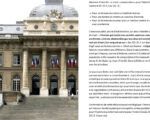>> Mississippi, Louisiana issue gay marriage licenses
[spacer]
La Cour suprême a légalisé le mariage homosexuel partout aux États-Unis, jugeant que la Constitution requiert d’un État qu’il célèbre et reconnaisse le mariage entre deux personnes de même sexe.
La plupart des 13 États qui s’opposaient à ces unions jusqu’à vendredi ont commencé à délivrer ces certificats dans la foulée de la décision, mais une poignée d’autres, dont le Mississippi (sud) et la Louisiane (sud), s’y étaient tout de même opposés.
Le ministre de la Justice du Mississippi a fini lundi par envoyer une note aux agents administratifs de l’État reconnaissant le mariage gay comme «loi de l’État» et précisant que les agents s’y opposant «pourraient être poursuivis par le couple». Il avait plus tôt affirmé que la loi ne serait pas «effective» jusqu’à ce qu’une autre Cour n’en décide.
Son homologue de Louisiane avait fait de même vendredi affirmant qu’il n’y avait pas de raison «légale» de célébrer ces mariages, la décision de la haute Cour ne stipulant pas noir sur blanc que la décision était «en vigueur immédiatement». Mais les agents administratifs d’un canton de La Nouvelle-Orléans ont décidé lundi d’appliquer la loi.
«Nous avons délivré notre premier certificat de mariage ce matin. C’était un couple de femmes», a indiqué à l’AFP Keeli Winston du canton de Jefferson.
Les couples homosexuels pourraient toutefois rencontrer des difficultés dans d’autres localités de Louisiane, ou encore au Texas (sud), où le ministre de la Justice local, Ken Paxton, a fait savoir aux fonctionnaires et juges de l’État qu’ils pouvaient opposer des «objections religieuses».
[spacer]
>> Some of the final barriers to gay marriage in America fell Monday as the southern state of Mississippi and at least one Louisiana parish began issuing licenses to gay couples.
A landmark decision by the Supreme Court Friday ruled that bans on same-sex marriage in 13 states were unconstitutional.
Most state and local governments responded by issuing marriage licenses within minutes or hours of the ruling.
But Mississippi’s attorney general issued a statement cautioning that the ruling would not be « effective » until a lower court responded.
He clarified that statement Monday in a note to clerks obtained by AFP which acknowledged that gay marriage is « the law of the land » and cautioned that clerks who refuse to comply « could be sued by the denied couple and may face liability. »
Louisiana’s attorney general insisted Friday there was « not yet a legal requirement for officials to issue marriage licenses or perform marriages for same-sex couples » because the decision did not state it was « effective immediately. »
The state’s clerks were reportedly instructed to delay issuing licenses until after a 25-day window for appealing the ruling closed.
But the county clerk in New Orleans decided Monday there was no need to wait.
« We issued the first marriage license this morning, » Keeli Winston of the Jefferson Parish clerk’s office told AFP.
« It was a female couple. »
Gay couples could still face barriers, however, at the local level elsewhere in Louisiana and in Texas.
Texas clerks and judges were instructed that they have the right to refuse to issue licences or perform marriages if they have « religious objections. »
« Although it fabricated a new constitutional right in 2015, the Supreme Court did not diminish, overrule, or call into question the First Amendment rights to free exercise of religion that formed the first freedom in the Bill of Rights in 1791, » Texas Attorney General Ken Paxton said in a statement Sunday.
Paxton acknowledged that clerks and judges who wish to « defend their religious objections » could be sued or fined, but said « numerous lawyers stand ready to assist clerks defending their religious beliefs, in many cases on a pro-bono basis, and I will do everything I can from this office to be a public voice for those standing in defense of their rights. »
Some 19 states have enacted religious freedom laws which could be used to protect officials and businesses who refuse to serve same-sex couples.


















